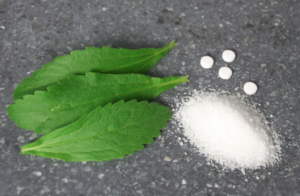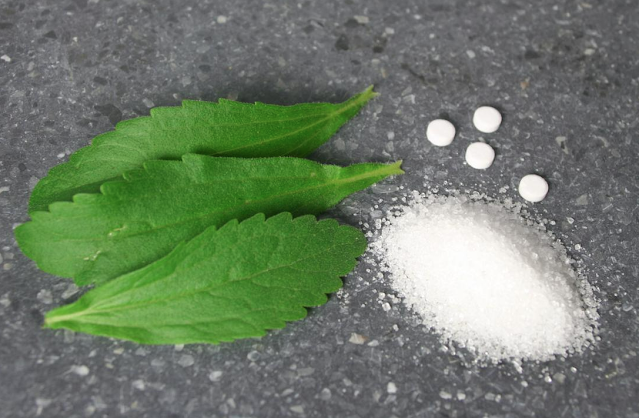Stevia: A Natural Sweetener and a Healthy Option
In addition to its sweet flavor, Stevia (STEE-vee-uh) provides several health benefits. Due to its complex stevioside structure, which is made of glucose, sophorose, and stevioside, Stevia is one of nature’s sweetest foods. Stevia’s sweetness is further enhanced by the presence of rebaudioside, a chemical found in the plant. Stevia has a distinct flavor that has been characterized as sweet and licorice-like, with a lingering bitterness. Very little bitterness is present in high-quality Stevia. Other natural sweeteners, sugar, and artificial sweeteners don’t compare well to Stevia’s sweetness. Some individuals may need some time to “get used to” the taste, although the majority of people soon get used to it.
In Paraguay and Brazil, indigenous people have long used the leaves of stevia to sweeten their yerba mate and other stimulant drinks, which are popular in those countries and beyond. In the family Compositae, the stevia plant may be found (sunflower family of plants). Native Paraguayans have been sweetening their bitter beverages for centuries with the leaves of this little herbaceous semi-bushy perennial plant. It may be found in semi-arid habitats ranging from grassland to scrub woodland to mountain ranges in South America. Pacific Rim nations have been cultivating the plant locally for decades, using it in its raw leaf form and commercially processing it into a sweetener.
Those who have tried stevia know how sweet it can be. This amazing Paraguayan plant has been used for generations as a sweetener and taste enhancer. As a sweet-tasting, non-caloric, non-fattening plant, Stevia has been widely utilized across the globe for its pleasant flavor as well as for its rising research potential to prevent fat absorption and reduce blood pressure.
In its natural form, stevia is around 300 times sweeter than sugar; when refined, the sweetness increases significantly. In medicine, it’s used to control blood sugar, prevent hypertension, cure skin conditions, and keep teeth from decaying, to name a few. Natural antibacterial and antiviral properties have been shown in other research. The health benefits of Stevia are undeniable! In addition, it has no calories or carbohydrates. It is a good option for diabetics, people who are trying to lose weight, and anybody who wants to keep their health in check.

Stevia has significant therapeutic properties when used topically. Initially, it hurts, but after a few minutes, the pain subsides and the wound heals quickly without leaving any scars. To use it as a facial mask, just apply the black liquid to your skin and let it dry for 30–60 minutes before washing with warm water. You’ll notice a reduction in the appearance of wrinkles, blemishes, and acne after using this product regularly. Seborrhea, dermatitis, and eczema have all been shown to benefit from this treatment. When it comes to hair and scalp care, adding Stevia concentrate to shampoo or applying it directly to the hair and letting it sit for a few minutes before washing has shown promising benefits.
Additionally, Stevia may be used for a variety of additional positive purposes. It has been shown that Stevia, for example, may improve mood and boost energy and mental sharpness. As has been shown, the development of bacteria in the mouth, which produces acids that lead to gingivitis and cavities, is inhibited.
Stevia has recently spread to the Far East. A sweetener and flavour enhancer created in the 1970s and 1980s, Stevia is extensively used in Japan, China, Korea, Israel and Paraguay for this purpose. In Japan, where it is used in soy sauce, sweet pickles, and soft drinks, it has been accepted. Stevia has been added to Diet Coke in Japan.
Soft drinks, ice cream, pastries, pickles, chewing gum, tea, and skin care products are just a few of the many things that employ Stevia as an ingredient. Stevia accounts for around 40% of the sweetener market in Japan. Japan, China, Taiwan, Thailand, Korea, Brazil, Malaysia, and Paraguay are the primary producers of stevia.
Many of the skin care products on the market now include Stevia, thanks to its widespread usage in the cosmetics sector. When used topically, it has been demonstrated to minimize the appearance of skin imperfections. Stevia may also help alleviate stomach pain.
However, everyone may benefit from the use of Stevia, which has no indications of lack. Diabetes, obesity, the elderly, children, and athletes are just some of the groups who might benefit from using Stevia.
Stevia may help those with diabetes, those with blood sugar issues, or those who are fat because of its ability to control blood sugar.
Hypertension sufferers may also get relief from their symptoms by using Stevia. Stevia has been demonstrated to serve as a vasodilator in situations of high blood pressure, thereby lowering hypertension.
When Stevia first appeared on the market in the United States in the late 1980s, an “anonymous business” filed a “trade complaint” with the FDA. The Celestial Seasonings herbal tea firm was one of the first to use stevia. The FDA has ordered them to cease production of tea that has been “adulterated” with Stevia extract. The Stevia teas were taken by the FDA during an unannounced search, and they were warned that the tea would be destroyed.
Why was Stevia made a restricted drug by the government? However, the FDA has labeled Stevia as a “dangerous food addition” despite years of extensive testing by Japanese experts. Despite the Freedom of Information Act, the FDA refuses to say who filed the “trade complaint,” despite the fact that many believe it was the producers of the artificial sweetener Aspartame (also known as “Nutrasweet”) who were seeking to keep out the competition.
Many people would presume it was a harmful drug given the FDA’s enormous efforts to keep Americans in the dark about Stevia. In truth, it has been used by millions of people over the globe, and in some places for hundreds of years, with no reported health problems.
For this reason, although Stevia may legally be sold as a supplement under 1994 law, FDA officials have refused to allow any reference to it being used as a sweetener or in tea.
The FDA partially revoked its prohibition on Stevia in 1995. However, it can no longer be marketed as a sweetener in the US, only as a “nutritional supplement.” Other nations are being urged to follow suit by the World Health Organization and the European Union.
